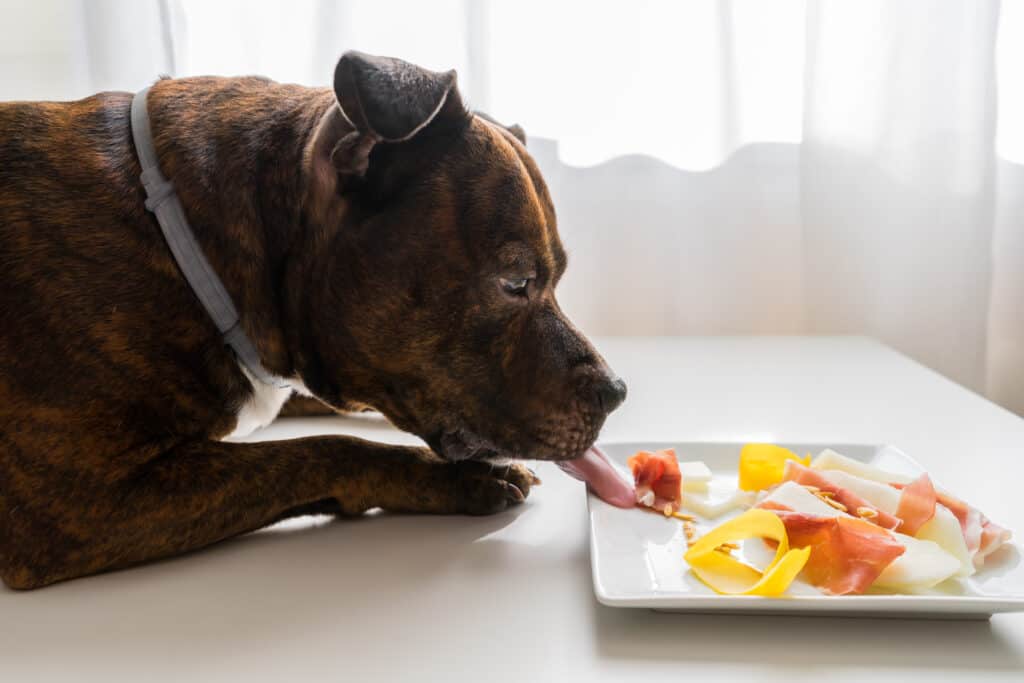Our website is supported by our users. We sometimes earn money when you click an affiliate link and make a purchase. This is at no extra cost to you and helps us to create quality content. Thank you for your support. For all that have shown us such wonderful support, we thank you from the bottom of our hearts!
If you’re a dog owner, you may be tempted to share your meals with your furry friend, but it’s essential to know what human foods are safe for dogs.
At holiday meals you may wonder can dogs eat ham? While ham is a popular food generally fit for human consumption, it’s not a good idea to feed it to your dog regularly.
Ham is a type of pork that has been cured and often contains high levels of salt, sugar and other spices.
While small pieces of ham are unlikely to cause harm to your dog, feeding them salty meats and fatty foods can regularly can lead to health issues such as obesity, pancreatitis, and gastrointestinal problems. Additionally, ham bones can be dangerous for dogs as they can cause choking or damage to the digestive tract.
If you’re looking for a safe and healthy treat for your fur babies, there are plenty of dog-friendly options available. Be sure to consult with your veterinarian if you have any concerns about your dog’s diet or health.
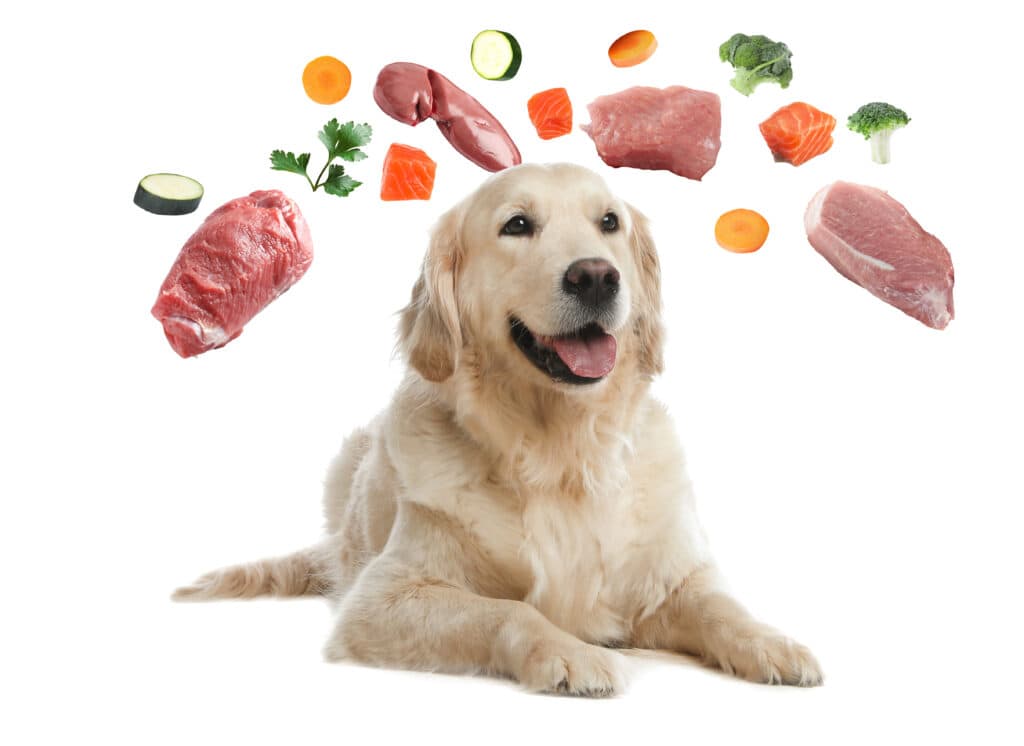
Can Dogs Eat Ham? Understanding Your Dog’s Nutritional Needs
As a responsible dog owner, it’s important to understand your dog’s nutritional needs to ensure they receive a balanced diet that will keep them healthy and happy. Here are some key points to consider:
Diet
Your dog’s diet should consist of a balanced combination of protein, carbohydrates, and fats. Protein is essential for building and repairing muscles, while carbohydrates provide energy. Fats are also important for energy and help with the absorption of certain vitamins.
Dog Food
When choosing dog food, look for brands that offer complete and balanced nutrition. The Association of American Feed Control Officials (AAFCO) sets guidelines for pet food manufacturers to ensure that their products meet minimum nutritional requirements.
Vegetables and Fruits
While dogs are primarily carnivores, they can benefit from certain fruits and vegetables in their diet. These foods can provide essential vitamins and minerals and also act as a source of fiber. Some safe options include carrots, green beans, broccoli and apples.
However, it’s important to avoid feeding your dog certain fruits and vegetables, such as grapes and onions, as they can be toxic.
Dog Nutrition
Proper dog nutrition is essential for maintaining good health. In addition to providing a balanced diet, it’s important to ensure that your dog has access to clean water at all times.
Regular exercise is also important to help maintain a healthy weight and promote overall well-being.
Dog Nutritional Needs
Your dog’s nutritional needs may vary depending on factors such as their age, breed, and activity level. Puppies and senior dogs may require different types of food than adult dogs, while working dogs may need a higher calorie intake to support their activity level.
Consult with your veterinarian to determine the best diet for your individual dog.
By understanding your dog’s nutritional needs and providing a balanced diet, you can help ensure that they live a long, healthy life.
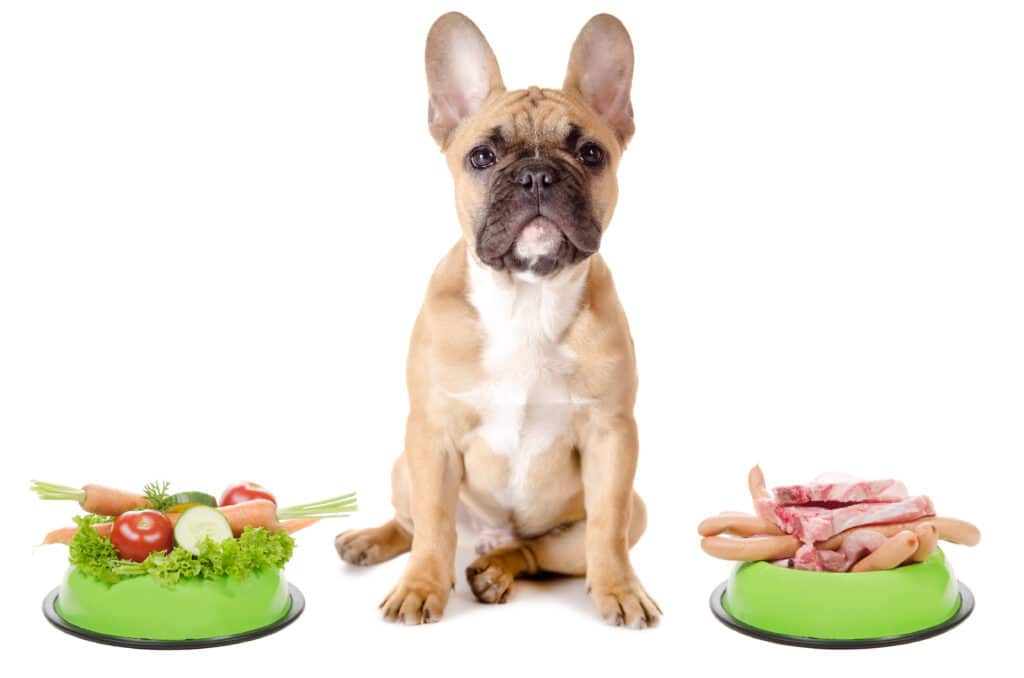
Can Dogs Eat Ham? Ham and Its Nutritional Content
Ham is a popular meat that many people enjoy. Some holidays aren’t holidays without a big, juicy ham. However, when it comes to your furry friend, you might be wondering can dogs eat ham? Before you decide to share your ham with your dog, it’s important to know what ham contains and how it can affect your dog’s health.
Ham is a type of pork that is high source of protein. According to the American Kennel Club, a 3-ounce serving of ham contains around 7 grams of fat and 17 grams of protein. While protein is essential for your dog’s health, too much fat can lead to obesity and other health issues.
In addition to being high in fat, ham is also high in sodium and salt. A high-sodium diet for dogs can cause health problems such as hypertension, kidney disease, heart disease, and obesity. According to PetMD, a 3-ounce serving of ham contains around 1,000 milligrams of sodium, which is more than half of your dog’s daily recommended intake.
Ham is also high in calories, which can contribute to weight gain and obesity in dogs. A 3-ounce serving of ham contains around 150-200 calories, depending on the type of ham.
Finally, ham is an animal fat, which can be difficult for dogs to digest. Too much animal fat in your dog’s diet can lead to digestive issues such as diarrhea and vomiting.
In summary, while ham contains protein, it is also high in fat, sodium, salt, calories, and animal fat. Feeding your dog ham can lead to health problems such as obesity, hypertension, kidney disease, heart disease, and digestive issues.
If you want to give your dog a treat, it’s best to stick to dog-friendly foods that are specifically designed for their nutritional needs.
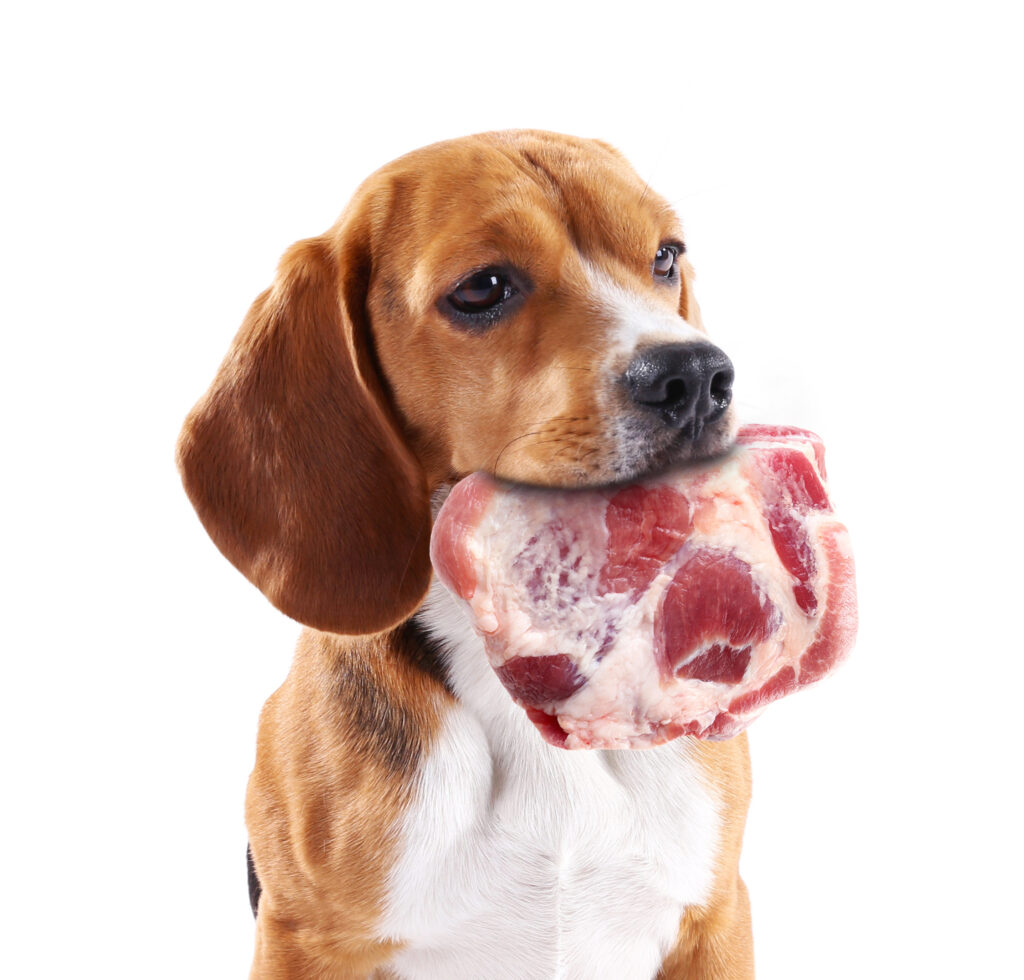
Can Dogs Eat Ham? Potential Risks of Feeding Ham to Dogs
Yes, dogs can eat ham but only in small portions. If you decide to give your dog a holiday treat from the holiday ham, just know that there are some potentially harmful substances that you need to be aware of.
While ham may seem like a tasty treat for your furry friend, it is not without its potential risks. Here are some of the main reasons why you should be cautious about feeding ham to your dog:
High Sodium Content
Ham is a very high-sodium food, which can be dangerous for dogs. Dogs who eat too much ham can potentially experience life-threatening salt poisoning, which can lead to symptoms such as excessive thirst, urination, diarrhea, vomiting, lethargy, and abnormal fluid accumulation.
When consumed in high quantities regularly by canines, high-sodium foods can also have more serious consequences, such as hypertension, kidney disease, heart disease, and obesity.
High Fat Content
Along with salt, ham is also high in fat. Dogs who consume too much fat can develop pancreatitis, which can cause symptoms such as vomiting, diarrhea, lethargy, and even death. Additionally, overweight dogs are at risk of developing other health problems, such as diabetes and internal damage.
Preservatives and Additives
Ham often contains preservatives and additives that can be harmful to dogs. For instance, nitrates are commonly used to preserve ham, and they can cause gastrointestinal upset and even illness in dogs. Some hams may also contain added sugar, which can contribute to obesity and other health risks.
Choking Hazard
Cooked and raw bones can be a choking hazard for dogs, and they can also cause obstructions in the digestive system. If your dog ingests a ham bone, they may experience symptoms such as coughing, lethargy, and gastrointestinal upset. In severe cases, surgery may be required to remove the bone.
Dehydration
Additionally, as mentioned, ham has a lot of salt. Therefore, it is a dehydrating food, which can lead to dehydration and other health problems if your dog does not have access to plenty of fresh water. On the flip side, remember that too much water can make your dog vomit.
Overall, while technically pet owners can give your dog small amounts of ham, it is not a healthy or safe food for them to consume regularly. Also, it doesn’t contain very many health benefits and there are far better sources of protein for your fur baby.
If you do choose to feed your dog ham, make sure to remove any bones, limit their intake, and monitor them closely for any signs of illness or discomfort.

Can Dogs Eat Ham? Feeding Ham to Dogs: Do’s and Don’ts
If you’re wondering whether you can give ham to your furry friend, the answer is not straightforward. While ham is safe for dogs to consume in moderation, there are certain do’s and don’ts you should be aware of before feeding it to your pet.
Do’s
- Feed ham in small quantities as an occasional treat. Ham is high in sodium and fat, which can lead to health problems like obesity, pancreatitis, and heart disease if consumed in excess.
- Always trim off any visible fat and remove the bones before feeding ham to your dog. Cooked ham bones can splinter and cause intestinal blockages or perforations, requiring emergency veterinary care and a trip to the emergency room.
- Consult with your veterinarian before introducing ham or any new food to your dog’s diet. Some dogs may have allergies or sensitivities to certain ingredients in ham, and your vet can advise you on the appropriate portion size and frequency of feeding.
- Look for nitrite-free ham, as nitrites can cause fluid accumulation, coma, and even death in dogs.
Don’ts
- Don’t feed your dog ham that is seasoned with garlic, onion, or other spices, as they can be toxic to dogs and cause damage to their red blood cells.
- Don’t give your dog ham as a regular part of their diet. It is high in calories and lacks the essential nutrients that dogs need to maintain a healthy GI tract. Avoid a lot of fatty meats for your canine friend on a regular basis since digestive upsets are common when consuming large amounts of pork products.
- Don’t give your dog ham bones to chew on, as they can splinter and cause blockages in their esophagus or GI tract. The FDA and most veterinarians recommend against feeding dogs any bones at all.
‘In summary, ham can be a tasty and nutritious treat for your dog when fed in moderation and prepared correctly. However, it’s crucial to follow the do’s and don’ts outlined above to ensure your pet’s safety and well-being.
If you have any concerns or questions about feeding a small amount of ham to your dog, always consult with your veterinarian.
Can Dogs Eat Ham? Frequently Asked Questions
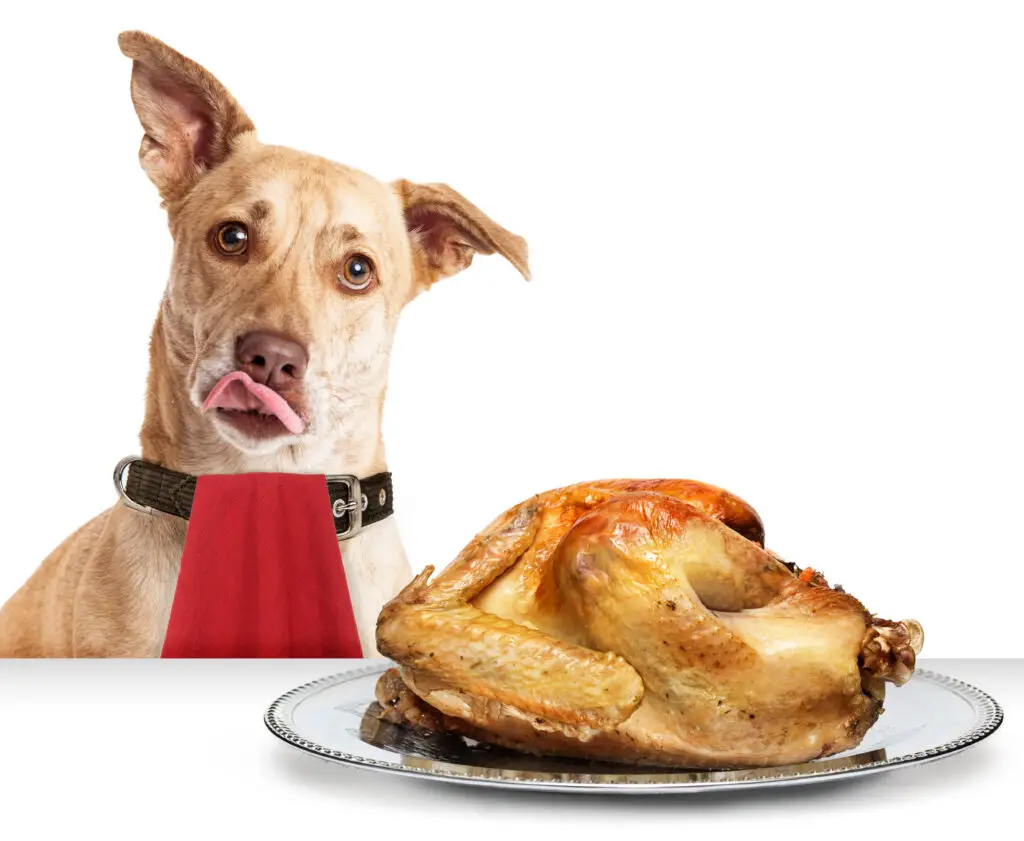
Can dogs have turkey?
Yes, Pet parents can feed their four-legged friend turkey as long as it is cooked and boneless. Turkey is a lean protein source that can be a healthy addition to your dog’s diet. However, be sure to remove any skin, fat, or bones, as they can cause digestive problems or even pose a choking hazard.
Can dogs eat ham made from turkey?
While dogs can eat turkey, it’s important to be cautious when it comes to processed meats like turkey ham. Turkey ham, like deli ham, typically contains additives, preservatives, like sodium nitrite, and seasoning that may be harmful to dogs.
Additionally, the high amounts of sodium content in processed meats can be problematic for dogs, as it can lead to dehydration and other health issues.
If you want to share some turkey with your dog, it’s best to offer plain, cooked turkey without any seasoning or additives. Remove the skin and bones, as these can cause choking hazards or other complications.
It’s always a good idea to consult with your veterinarian before introducing any new food to your dog’s diet, as they can provide personalized advice based on your dog’s specific needs and health conditions.
All ham is high in sodium and some contain a lot of fat, but packaged store-bought ham and deli ham, though leaner, can still contain too much salt.
This can lead to health problems such as hypertension (aka high blood pressure), kidney disease, heart disease, and obesity. Additionally, many processed types of meat, not just ham, contain preservatives and additives that can be harmful to your dog’s health.
Better options include:
Unprocessed roast chicken. Remember rotisserie chicken is soaked in a brine solution with salt, sugar, spices and contain excess fat, so it is NOT unprocessed.
Unprocessed beef (some cuts can have a high-fat content so be vigilant)
Unprocessed turkey
Unprocessed lamb
We recommend some healthy meat snacks like:
Just Jerky Treats– Made in the USA with no fillers (wheat, corn or soy), preservatives (including salt) or chemicals. They have chicken, pork and vegetable versions, which nice for the dogs that are allergic to chicken.
Beloved Chicken Jerky dog Treats– They are organic with no preservatives, corn or soy (2 potential allergens). If your dog is sensitive to fat, they contain very little to no fat.
However, they do contain a little bit of salt and sugar. Because of the tiny bit of salt, make sure your dog has access to plenty of clean water.
Pur Luv Chicken Jerky Treats – These treats are made with chicken breast and have very few ingredients. They too do have a bit salt though. So again, make sure your dog has access to clean water.
Full Moon Natural Cut Pork Jerky– They are purely pork and also filler-free (no wheat, corn or soy). They do contain salt and sugar (natural preservatives) so, you know the drill by now, make sure your little buddy has plenty of clean, fresh water.
What happens if my dog eats ham?
If your dog eats ham in a small quantity, more than likely your dog will be fine. However, it can cause digestive problems such as stomach upset, vomiting and diarrhea.
Additionally, the high sodium content in ham can lead to dehydration and other health problems.
If your dog has eaten ham and your dog vomits, or shows signs of upset stomach contact your veterinarian immediately.
Can ham kill a dog?
While ham is not toxic to dogs, it can be harmful in large quantities.
The high sodium and fat content in ham can lead to health problems such as hypertension, kidney damage, heart problems, inflammation of the pancreas and obesity.
In addition, ham bones can pose a choking hazard or cause intestinal blockages, which can be life-threatening.
Can dogs eat ham bones?
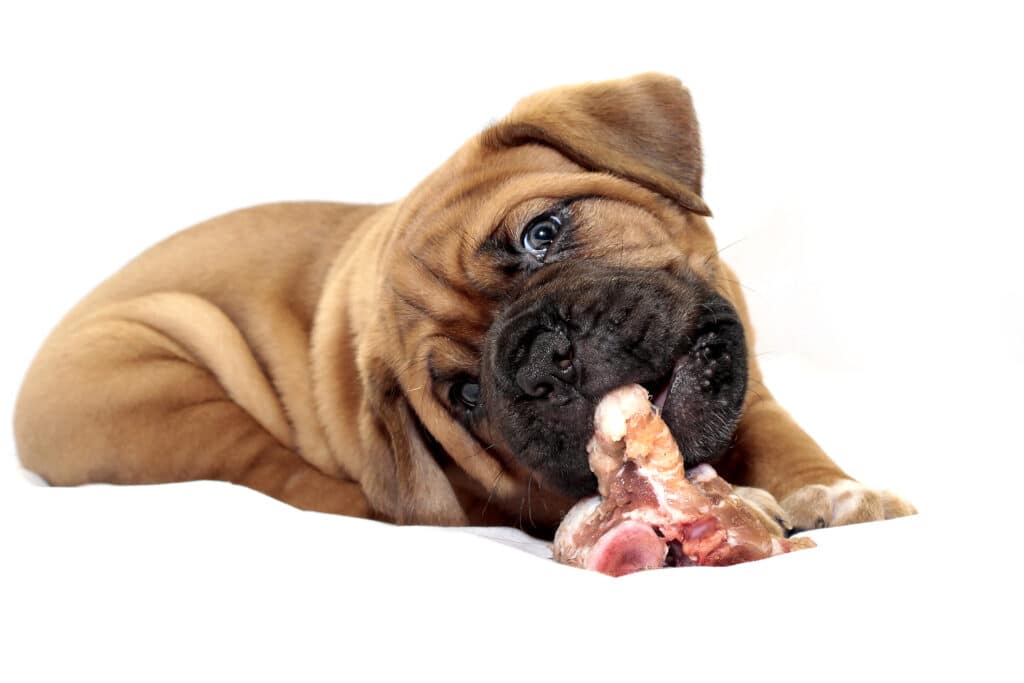
No, dogs should not eat ham bones. Cooked bones, including ham hocks, or even raw ham bones can splinter and can get caught in your dog’s throat and cause blockages, or even puncture your dog’s internal organs.
This can lead to life-threatening conditions or can even be fatal.
The Bottom Line on Can Dogs Eat Ham?
In conclusion, the question of whether dogs can eat ham is nuanced, with various considerations and potential risks for pet owners to be aware of. While ham itself is not toxic to dogs, feeding it to them regularly poses significant health concerns due to its high content of salt, fat, and other additives.
The nutritional content of ham, including its high sodium levels, can lead to severe health issues such as hypertension, kidney disease, heart problems, and obesity. The fat content in ham also raises the risk of pancreatitis and other digestive problems in dogs.
Furthermore, the presence of preservatives and additives in processed ham adds another layer of potential harm.
The risks extend to ham bones as well, which can pose choking hazards or lead to intestinal blockages if ingested by dogs. Even in small amounts, ham bones can splinter, causing damage to the digestive tract and requiring emergency veterinary intervention.
To responsibly incorporate ham into a dog’s diet, pet owners should adhere to specific do’s and don’ts. Moderation is key, with small, occasional servings as treats. It is crucial to trim off visible fat, remove bones, and opt for nitrite-free ham to mitigate potential risks.
Additionally, consulting with a veterinarian before introducing ham or any new food into a dog’s diet is advisable, as individual factors such as allergies and sensitivities should be considered.
The article emphasizes the importance of understanding a dog’s nutritional needs, including a balanced diet of protein, carbohydrates, and fats.
It also stresses the significance of providing clean water, regular exercise, and consulting with a veterinarian to tailor a diet to a dog’s specific requirements based on factors like age, breed, and activity level.
In summary, while ham can be offered as an occasional treat when precautions are taken, it is not a recommended or healthy regular food for dogs.
Pet owners are encouraged to explore safer and more suitable alternatives for their furry companions, ensuring a long, healthy life for their canine friends.
Please read our Legal Disclaimer

